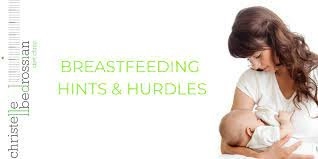Breastfeeding Hints and Hurdles
ready for success
1/12
Breastfeeding is a special bonding time with many health benefits for you and your baby. It requires a little know-how, so you may have many questions. If your first experience is far from perfect, don't worry! A lactation consultant (and these tips) can answer some of the most common breastfeeding questions.
Nursing ABC
2/12
• Awareness:
Feed your baby whenever he is hungry. Watch for signs of hunger, such as the sound of sucking, hands close to mouth, and baby turning to chest. Crying is considered a delayed sign.
• Be patient:
A baby usually suckles from each breast for her 10-20 minutes.
• comfortable:
Support your feet and support your arms and head with pillows.
relieve nipple pain
3/12
Your nipples may be a little sore at first. To soothe sore nipples, use a moist warm compress, rub fresh breast milk on the nipple, and let it air dry. Alternatively, dab on Lanolin or All-Purpose Breastfeeding Nipple Ointment. Some pain and tenderness is normal. Once you find the right breastfeeding position and your baby is comfortable, the pain usually goes away. If the pain increases or persists for several weeks, be sure to see your doctor. If you have swollen or reddened breasts, fever or body pain, see your doctor right away.
How often does your baby breastfeed? 4/12
According to the American Academy of Pediatrics, a newborn should feed her every two to three hours. That's 8-12 times in 24 hours. And sometimes the baby can give even more breast milk.
Your child can feed from both breasts in one feeding session. You can also switch pages. If you slow down or turn your back, your baby will feel full. After her first month, you can go back to 7-9 times a day.
Should I wake my baby for breastfeeding?
5/12
Yes, the first few weeks. A newborn she needs to breastfeed about 8 times a day, with no more than 4 hours between feedings. To help your baby wake up, try removing blankets, changing your baby's diaper, gently massaging your baby, or laying your baby on your skin.
Should I use both breasts?
6/12
After a few weeks of breastfeeding, empty one of your baby's breasts before switching to the other. reason? There are two types of milk for each lactation.
Followed by a thinner, thirst-quenching foremilk, and a creamier, higher-fat aftermilk. Babies need both. If your baby has finished eating only the first breast while breastfeeding, donate the other breast at the next feed.
What is Nipple Confusion?
7/12
Nipple confusion occurs when a baby bottle feeds too early and forgets how to feed with the mother's nipple. Not very common, but easy to avoid. If you plan to introduce bottle feeding, wait until your baby is nearly four weeks old. Try to avoid using a pacifier. However, don't wait too long to introduce the bottle later. Your baby may have trouble accepting a bottle.
Is your baby drinking enough?
8/12
As long as your baby is gaining about a pound in her month, breastfeeding every 2-3 hours, and wetting about 6-8 diapers a day, you can rest assured that your baby is eating everything she needs. I can do it. good news:
By the second month, some babies no longer need midnight snacks and can even sleep through the night.
Are you suddenly breastfeeding?
9/12
Babies thrive when they feel that they are being breastfed 24/7. please do not worry. Not only will your body produce more breast milk, but these super-hunger periods are temporary.The growth spurt usually occurs during her second week of baby, then two months, four Months, six months it will happen again. Even better news:
Most babies are ready to try solid foods between 4 and 6 months of age.
Is Your Diet Affecting Your Baby?
10/12
What you eat affects your milk supply, but usually not as much as most new moms think. In general, you can eat and drink whatever you want as long as you have a healthy and balanced diet. However, avoid very spicy or gas-producing foods. Also, watch out for baby allergy symptoms that first appear in her 4-6 weeks. If you're not sure, ask your baby's doctor. Can I smoke, drink alcohol, or breastfeed?
11/12
Neither is best. Smoking exposes your baby to nicotine and other toxic chemicals. Also, milk production may decrease. It has been shown to increase the risk of SIDS and respiratory allergies. Talk to your doctor if you need help quitting smoking. Alcohol also passes into breast milk. This can affect your baby's development. The American Academy of Pediatrics says it's okay to have an occasional beer or wine, but wait at least two hours before breastfeeding. to no more than 2 glasses of beer, 4 ounces of wine and 2 ounces of spirits.
Bonding without breastfeeding
12/12
Breastfeeding is just one of her ways to bond with her baby. The bond between parent and child grows every time you hug, talk to, sing, bathe and play with your baby.
30 Dec 2022







